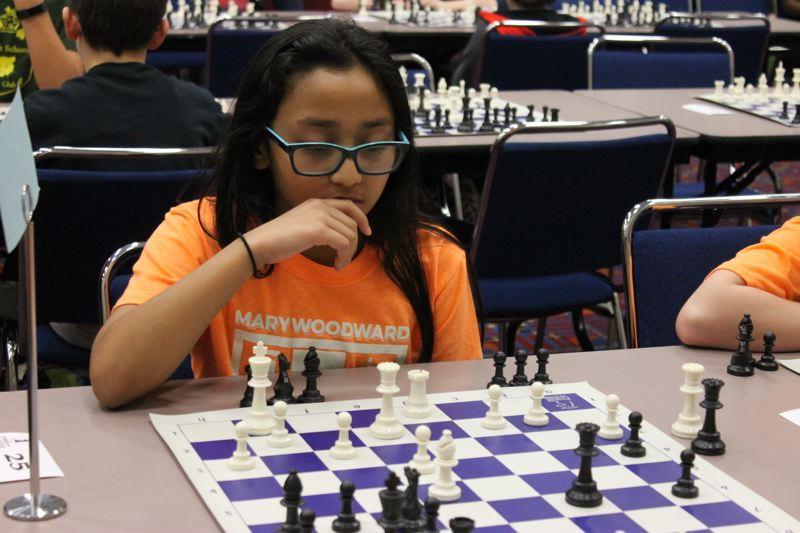
Chess for Success: Students love strategy
Students, teachers, coaches and parents divulge that the benefits of chess play goes beyond the board at the 50th anniversary tournament.
It was all about strategy for students from near and far who gathered at the Oregon Convention Center this weekend for the 50th anniversary Chess for Success state tournament.
The center somehow carried an oxymoronic atmosphere of frantic concentration, as children as young as kindergarten up through seniors in high school competed in what some call a mind sport.
The competition was open to all K-12 students in Oregon, and this year 30 elementary school teams and 18 middle school teams qualified for the state tournament.
Steve Rosenfeld, who was dressed as a "Chess King" in the cafeteria where children would hang and practice between rounds, said the game is the "single most important non-academic activity that helps kids learn."
The retired Portland Public Schools teacher of 32 years is now a program manager for Chess for Success, and is very passionate about both the game itself and the after-school program.
"There's a surprising amount of character building from learning how to be a loser or a gracious winner, because we teach kids at the end of each game to shake hands and say something nice to your opponent, whether you won or lost," Rosenfeld said. He adds that the benefit of the game to children is even broader, teaching children to problem solve and focus, which meld together to help in academic situations and beyond.
He started the chess club while a first grade teacher at Jason Lee Elementary School in 1993. Rosenfeld didn't want to stop being involved with chess when he retired, so he began working for Chess for Success, where he's responsible for making sure schools that run Chess for Success after-school programs in Southeast and outer Southeast Portland have materials needed to be successful.

At the tournament, Rosenfeld becomes the Chess King to boost morale of kids who come to the tournament. He says many of the children who come aren't necessarily used to losing before attending the tournament, since they're suddenly up against the other top 10 percent of chess players in the state.
Rhys Greensted, a 13 year old at Ockley Green Middle School, was happy when he came out from winning a round, after previously losing a round. He really likes the strategy part of the game.
"You have to think so many moves ahead and you have to go over and over again in your head and just keep repeating it, and see if there's any flaws with it," he says. "And it's just that complexity of ... having to have the discipline to wait to think all the moves out."
Rhy's father, Richard, is a volunteer coach at Chief Joseph Elementary in North Portland, where the club has 50 students. He says the thinking helps students "gain confidence in their abilities to solve complex problems."

The Chess for Success program is in 82 elementary and middle schools across Oregon, supporting 3,400 children. It sees a ratio of 69 percent boys and 31 percent of girls, more than four times the national average of girls in chess clubs, according to statistics provided by the program.
Fifth grader Makenzie DeVault, 11, from Oregon City's John McLoughlin Elementary School, attended the tournament with her grandfather Mark Hagey.
"I like the strategy," DeVault said, while the two played the game together in the cafeteria. She has been playing since 3rd grade. She joined the club because she "thought it would be fun to learn a new game."
Three students from Lake Oswego's Westridge Elementary School participated in the tournament cited different reasons for playing the game. Carlito Bryant Garcia, 11, liked playing against people who have different strategies, and in that way can "make it your own game."
Harry Baker, 11, prefers it to other games again because of the game's complexities.

"A lot of other games involve a lot of luck," he said.
Meanwhile, Christopher Morrissey, 10, bluntly it all started when his friends were in chess club, then his dad got involved. "Harry was really good and my dad wanted me to beat Harry," he said.
Whatever the reason one wants to play or join a chess club, there's seemingly no doubt that the game bleeds into other parts of life in a positive way.
John Walden, principal of Harrison Park School on Southeast 87th Avenue, was there to support one of his fifth grade students who qualified, Kelly Zhu. He's always amazed when students from less affluent schools are able to rise up.
"You're going up against schools where kids have private coaches, so it's really incredible," he says. But more importantly, he notes, "Ya know, it's not about making it to state. Kids need performance activities.

"For some it's sports. To some of these kids, chess is like a sport. Or it could be music. But the more avenues we can have for kids to participate in those, I think there's a definite cross over to how they do in school," Walden said.
Source: Portland Tribune
Link: http://portlandtribune.com/pt/9-news/349646-229034-chess-for-success-students-love-strategy